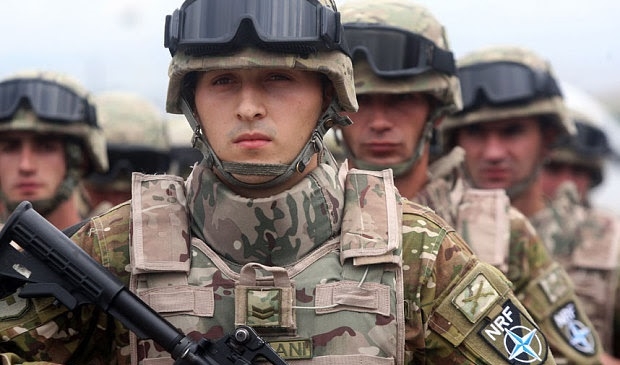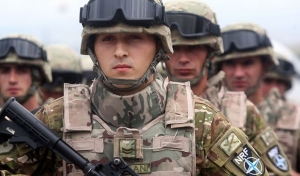NATO Mulls New Association Partnership For Georgia and Ukraine
BRUSSELS – As tensions between the West and Russia continue to escalate, the NATO military alliance may look to bolster its ranks by signing a special partnership agreement with Georgia and Ukraine.
Alliance members are currently discussing the possibility of offering Tbilisi and Kiev a newly devised association status under a 28+2 format that would see Georgian and Ukrainian armed forces fully cooperate with NATO in the Black Sea region and along the two countries’ long militarized borders with Russia.
Any such offer would be a significant move by the alliance as it would formally integrate the two former Soviet republics’ militaries into the NATO command structure without granting them full membership status.
Both Georgia and Ukraine have publicly stated their intention to join NATO and the European Union in the coming years as part of their drive towards Euro-Atlantic integration.
Russia, however, has violently opposed any such move as it views NATO expansion as a threat to its national security and an inherently anti-Russian, US-led campaign to weaken Moscow’s influence in areas where the Kremlin has historically played the role of imperial master.
The alliance’s 28 current members have greeted Georgia’s and Ukraine’s plans pursue formal membership with a mix of both enthusiasm and scepticism. Eastern European members, the United States and the United Kingdom have enthusiastically backed Tbilisi and Kiev while key members France and Germany have vehemently opposed the idea.
Opposition from Berlin and Paris has drawn the ire of newer members Poland and the Baltic States, all former Eastern Bloc nations that border Russia. They accuse the Germans and French of undermining Georgia and Ukraine’s security to avoid antagonizing Moscow. Warsaw has openly criticized Germany and France for having supported closer cooperation and the possibility of NATO membership for traditionally neutral Sweden and Finland, accusing the two alliance powers of a double standard towards former Soviet republics.
Georgia previously attempted to secure a NATO Membership Action Plan (MAP) at the 2008 Bucharest Summit but was met with a firm rejection from Germany and France. Russia responded to Georgia’s move by substantially bolstering its forces in the country’s breakaway region of South Ossetia. The resulting five-day war in August of that year was a major military defeat for Tbilisi and set its NATO ambitions back years, according to most analysts.
Georgia had hoped to receive an MAP at this year’s Warsaw summit, but government officials now acknowledge that the current political realities in the region mean that the new associate partnership is a major step towards eventual NATO membership.
"We are currently in the third stage of the NATO integration process – which is an intensive dialogue, followed by Georgia’s implementation of the Partnership for Peace initiative. The fourth step will be granting Georgia an MAP," Vakhtang Maisaia said, the former chair for Georgia-NATO relations.
Russian President Vladimir Putin has threatened to use force to thwart any attempt by any former member of the Soviet-led Warsaw Pact countries to integrate with NATO.
Any attempt of rapprochement between NATO and the former Soviet republics, according to most analysts, will make Moscow nervous and probably even more unpredictable.
Brussels recently established the association membership status as a consolation prize for Georgia and Ukraine instead of the promised MAP, according to Maisaia.
NATO Deputy Secretary-General Alexander Vershbow previously proposed the 28+2 format at an April security conference in Kiev. The association agreement with Georgia and Ukraine will be modelled on a similar arrangement that NATO currently has with Nordic powers Sweden and Finland, according to Vershbow.
Vershbow said the agreement must be implemented as soon as possible as “Russia plans to station nuclear weapons in the Black Sea region, including on the illegally annexed Crimean Peninsula. This is a move that will ultimately undermine and fundamentally change the regional balance of power.”
Experts, however, argue that if Tbilisi and Kiev join the 28+2 format, this would Russia will be further isolated in the Black Sea region as Bulgaria, Romania and Turkey consolidate their naval forces into a newly formed NATO Black Sea Fleet.
Georgia and Ukraine have already indicated that they plan to be active participants in the new maritime force.
The decision to offer Tbilisi and Kiev closer cooperation with NATO’s other 28 members comes at a time when comments from incoming Supreme Allied Commander General Curtis Scaparrotti raised eyebrows after he said NATO must be ready to respond to Russian provocations with force if needed.
“NATO is facing a resurgent Russia that is striving to project itself as a world power…to address these challenges, we must continue to maintain and enhance our levels of readiness and ability to fight tonight if deterrence fails," said Scaparrotti.
Alliance members are already in the process of re-deploying significant numbers of rapid strike forces to Eastern Europe to bolster NATO’s defensive capabilities. US, UK and German forces will carry out a major combat-ready training exercise with Georgian units at the alliance’s training facility outside Tbilisi later this month.
By Nicholas Waller












